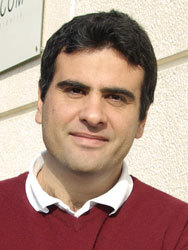Lecturer Section: Petros Elia

Petros Elia
Mobile Communications Department
EURECOM, France
Title
Anyhow, anytime feedback in classical multiuser channels
Abstract
In the setting of multiuser wireless communications, the challenge is to accommodate for many users, and do so at high rates and reduced power consumption. A crucial tool towards achieving this challenge can be found in feedback, i.e., in the ability to communicate information to the transmitter regarding the state of each user's channel. Whereas having no feedback often forces communicating to just one user at a time, having perfect feedback can in many cases allows for simultaneous treatment of many users. While crucial, feedback is also notoriously hard to get. Our aim here is to give an exposition of the problem of communicating in the presence of limited, imperfect and delayed feedback. We will focus mainly on the broadcast channel, and offer an exposition of very new results, most of them in fact from this same year. In this exposition we will focus on new tools and methods on how to:
- exploit delayed feedback;
- combine delayed feedback with imperfect current feedback;
- reduce the overall number of (delayed + current) feedback bits;
- achieve near-optimal performance with feedback delays;
- exploit gradually arriving feedback;
- exploit feedback that alternates from user to user;
- communicate with imperfect and delayed global channel state information at the receivers.
In the process we will seek answers to different fundamental questions such as:
- How many bits of feedback must we communicate, and when, in order to achieve a certain performance?
As well as seek to answer more practical questions such as:
- Can a specific accumulation-rate of feedback bits, guarantee a certain target rate?
- Can imperfect feedback allow for optimality?
- What is better: less feedback early, or more feedback later?
- Can imperfect delayed feedback be as useful as perfect delayed feedback?
- Given a certain target rate, what is the tradeoff between feedback delays and feedback quality?
- How many feedback bits must be accumulated before the channel changes, in order to achieve a certain performance?
- How many (delayed) feedback bits must be gathered after the channel changes in order to achieve the best possible performance?
- When is delayed feedback unnecessary?
Bio
Petros Elia received the B.Sc. degree from the Illinois Institute of Technology, Chicago, and the M.Sc. and Ph.D. degrees in electrical engineering from the University of Southern California (USC), Los Angeles, in 2006. Since February 2008, he has been an Assistant Professor with the Department of Mobile Communications, EURECOM, Sophia Antipolis, France. He has been the recipient of the Fulbright scholarship, the co-recipient of the USC-EE Best Student Paper Award, the co-recipient of the Distinguished Achievement Award of NEWCOM++ Network of Excellence in Telecommunications 2007–2011, as well as a co-recipient of the best student paper award at SPAWC 2011. He has also been a Visiting Scholar with the Indian Institute of Science in 2004. His research interests include information theoretic and coding aspects of wireless communications, cooperative communications, MIMO transceiver design-performance-complexity, interference mitigation, dense network behavior, queueing theory for cross-layer aspects, soft-biometrics and surveillance systems.


